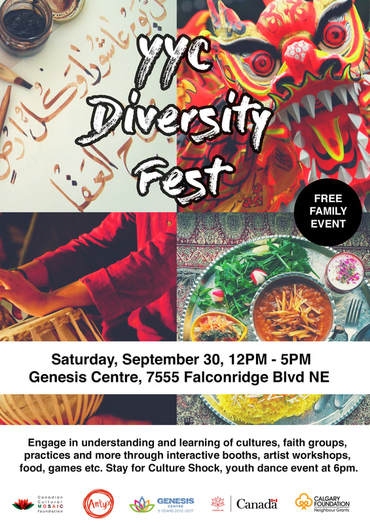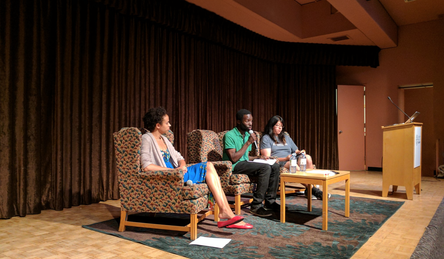 Get to know the diversity of people that are part of our city. Learn about the diversity of cultures and ethnicities in Calgary. This year during Culture Days on Sep. 30, come out to YYC Diversity Fest at the Genesis Centre where folks can engage in understanding and learning of cultures, ethnic groups, practices and more. Enjoy over 30 interactive booths, free cultural foods, entertainment and artist showcases, as well as other learning opportunities free for all. Following the event, stick around for Culture Shock 2017 at 5:30pm, an urban youth dance battle celebrating diversity and community put on by Antyx Community Arts. Culture Days is a 3 day-long, annual collaborative pan-Canadian volunteer movement to raise the awareness, accessibility, participation and engagement of all Canadians in the arts and cultural life of their communities. Schedule of Performances: 12pm: Land Acknowledgement, Welcome, Thank you to partners and funders 12:15pm: Indigenous Traditional Hoop Dance (Indigenous Dance Studio) 12:30pm: South Asian Dance Performances 1pm: Chinese Traditional Dragon Dance (Honan Shaolin Association) 1:15pm: Choreographed Dance/Song performance (Progressive Cultural Association Calgary) 1:30pm: Russian Folklore Singing Group (Russian choir "Razdolie) 2pm: Free Food is Served! (Biryani from Tandoori Kabab Hut Restaurant) 2:15pm: Teekay performance (Calgary hip-hop singer, Tarik Robinson from Dragon Fli Empire) 2:45pm: Epic Bhangra Dance Performance 3pm: Brazilian Music and Dance Performance 3:30pm: Sarb Akal Music School (Classical Indian Music, Flute and Drums performance) 4pm-5pm: Battle of the Choirs ("Symbol" Choir from Bucharest, Romania vs. MRU's Ariosso Choir)
1 Comment
 Photo by @Reakash Photo by @Reakash By Mansharn Toor, Policy Analyst at Canadian Cultural Mosaic Foundation The former contributor to the Toronto Star, The Walrus and the Torontoist, Desmond Cole has spent much of his adult life challenging policing and racism in Canada. Cole, having been a victim of police discrimination, is now travelling through Alberta to discuss the practice of carding. At a discussion at the Calgary Public Library, Cole educated the audience on what the practice of carding involves, our rights, the role of an ally and the trends across Canada and more specifically in Alberta. Here are major points you'll want to remember and understand: 1. What is Police Carding? Carding, quiet simply, is when an individual who is in a role of authority gathers personal information of an individual without reasonable suspicion that you have or were about to break the law. While carding is often associated with the police, the interrogation of an individual and tracking of information can occur in various places where the authority abuses their position of power. Carding can result in the gathering of sensitive information that is then shared across jurisdictions, with the RCMP and even with Canada’s Security Intelligence Services (CSIS). The consequences of police carding and tracking of personal information is significant and has led to harassment, mental aguish, and in some cases the loss of life. As the next section will allude to, people from marginalized communities are disproportionately targeted by the police. 2. Trends across Canada While statistics are important and should be utilized, Cole is quick to point out that people of colour have been saying what the statistics have for years. In many cases, simply talking to people from marginalized communities can inform the lay person of the issues and concerns. However, as we know numbers speak louder than words. And the numbers don’t paint a pretty picture. Indigenous people (especially women), black communities and Middle Eastern people are far more likely to be carded than their white counterpart. The overrepresentation of Indigenous women is extremely troubling provided that the police are part of the reason for the high rates of Missing and Murdered Indigenous Women and Girls. Persons with mental health issues, from the LGBTQ+ community and from poor socio-economic environments are not given the help they desperately need by the police and authorities. Rather, racism and discrimination are rationalized in the name of keeping neighbourhoods safe. However, the Rocky Mountain Civil Liberties Association (RMCLA) in Alberta has observed that carding simply does not correlate with crime statistics. Cole, has been stopped by the police over 50 times, he now uses these four words and recommends anyone who is the victim of police carding to state: “am I being detained?”. These words are important because Section 9 of the Charter of Rights and Freedom protects individuals from being arbitrarily detained. 3. Becoming an Active Ally Cole confronted the issue of an active ally, by exclaiming that words do not matter as much as actions. Privilege is a responsibility and must be acted upon. As one activist in the audience expressed, it is not always safe to stand up against the police and can lead to abuse, violence, and loss of life. The loss of life and harassment is becoming all to normal in Canada which is why its important that ally’s place their bodies, themselves in between and beside individuals who are victims to unfair policing or anyone wearing a uniform. It becomes the job of the general public to pressure politicians and Canada to enforce freedom rather than continuously seek justice. One manner is to put an end to the practice of carding. Finally, it is equally vital that the information collected by the police is handed over to the public to be utilized by academics, researchers and policy makers to inform and assist vulnerable communities. Cole is currently working on an upcoming book on systemic racism in Canada, sure to be a best seller. We'd like to thank Progress Alberta and Desmond Cole for putting on these events and educating us all. |
Archives
January 2024
|
 RSS Feed
RSS Feed
